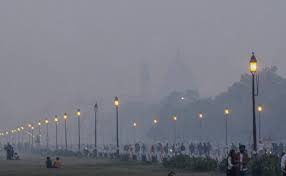 agencies agencies
NEW DELHI, Apr 25: Poor air quality in India may be associated with impaired cognition in infants under the age of two, when brain growth is at its peak, according to a study.
Cognition is the process of acquiring knowledge and understanding through thought, experience, and the senses.
Without action, the researchers said, the negative impact on children's long-term brain development could have consequences for life.
"Prior work has shown that poor air quality is linked to cognitive deficits in children, as well as to emotional and behavioural problems, which can have a severe impact on families," said lead researcher Professor John Spencer, from the University of East Anglia, UK. "Very small particulate fragments in the air are a major concern as they can move from the respiratory tract into the brain," Spencer said.
Until now, studies have failed to show a link between poor air quality and cognitive problems in babies, when brain growth is at its peak and the brain may be particularly sensitive to toxins.
"We worked with families in rural India to see how in-home air quality affects infants' cognition," Spencer said.
The team collaborated with the Community Empowerment Lab in Lucknow, India - a global health research and innovation organisation that works with rural communities to engage in science collaboratively.
They worked with families from a range of socio-economic backgrounds in Shivgarh, a rural community in Uttar Pradesh - one of the states most strongly impacted by poor air quality. The study, published in the journal eLife, assessed the visual working memory and visual processing speed of 215 infants using a specially-designed cognition task from October 2017 to June 2019. On one display, the toddlers were shown flashing coloured squares that were always the same after each 'blink'. On a second display, one coloured square changed after each blink. "This task capitalises on infant's tendency to look away from something that's visually familiar and towards something new," Spencer said. "We were interested in whether infants could detect the changing side and how well they did as we made the task harder by including more squares on each display," the researcher added. The team used air quality monitors in the children's homes to measure emission levels and air quality. They also took into account and controlled for family socio-economic status.
|
